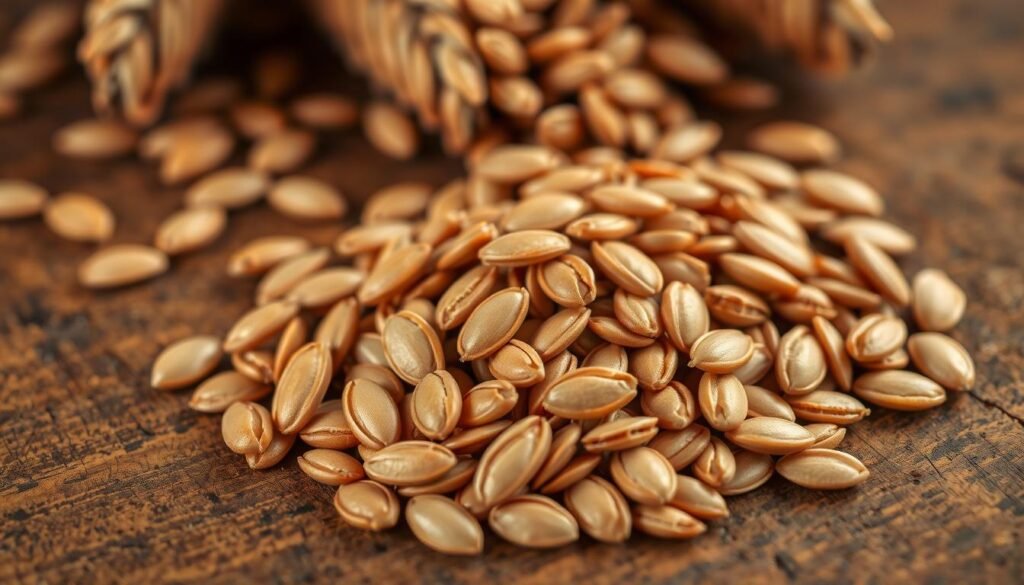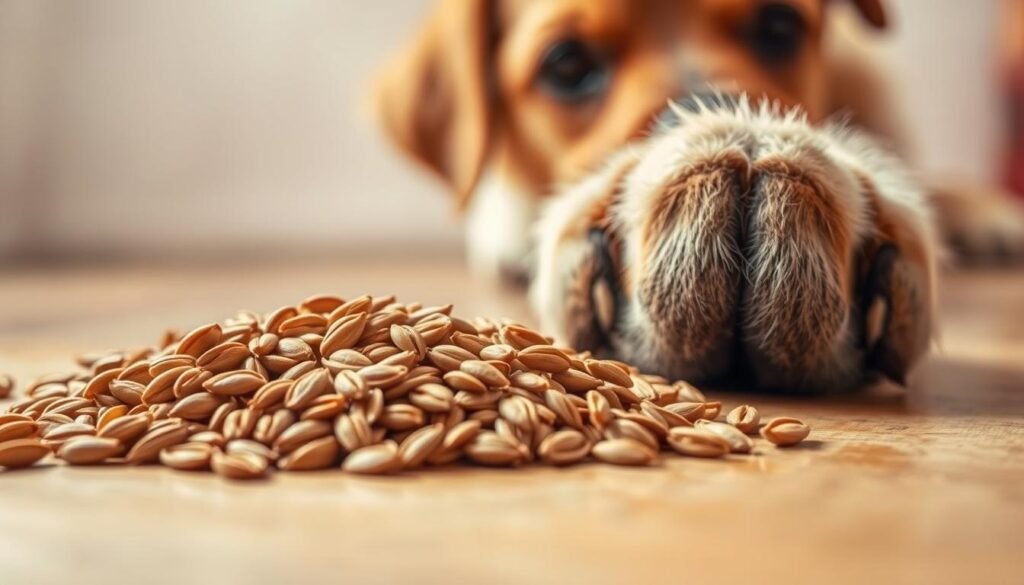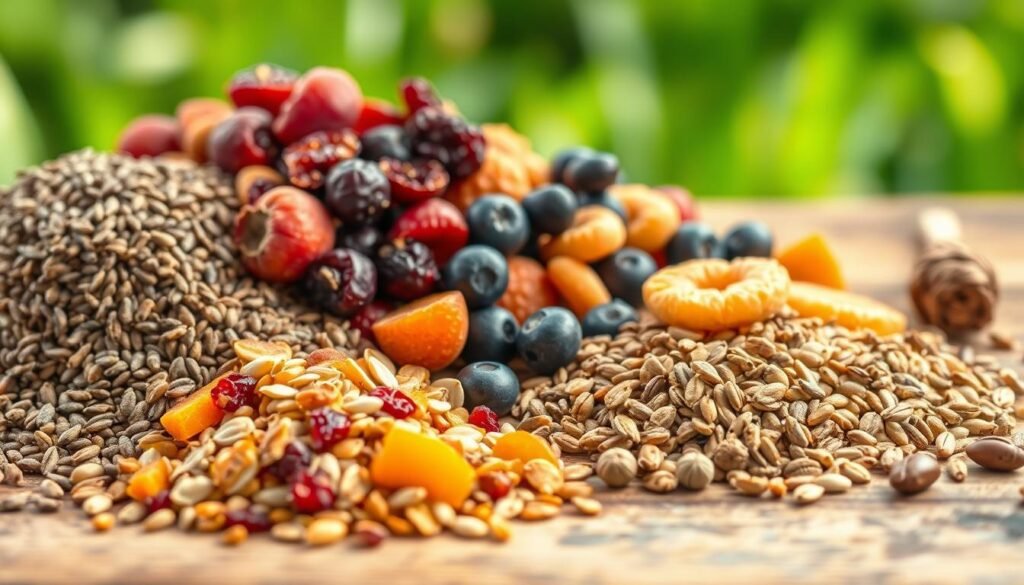If you own a dog, you’re always looking for ways to keep them healthy. But with so many trendy ingredients, it’s normal to ask: are flax seeds good for dogs? Flaxseeds, which come from the flax plant, have become increasingly popular. They’re packed with nutrients like omega-3 and omega-6 fatty acids, fiber, and protein—making them a great addition to your dog’s meals.

Flaxseeds are good for many things, and knowing about them is important for dog owners. Adding flaxseeds to your dog’s food can help them stay healthy overall.
Key Takeaways
- Flaxseeds are rich in omega-3 and omega-6 fatty acids, fiber, and protein.
- These nutrients can contribute to improved overall health for dogs.
- Incorporating flaxseeds into a dog’s diet can be a valuable nutritional decision.
- Understanding the benefits and possible risks is key for dog owners.
- Flaxseeds can be a healthy supplement for dogs when used right.
What Are Flax Seeds?
For dog owners, knowing about flax seeds is key to better nutrition for their pets. Flax seeds come from the flax plant, Linumusitatissimum. They are packed with nutrients.
Flax seeds are full of omega-3 fatty acids, fiber, and protein. They are called superfoods because of their alpha-linolenic acid (ALA), an omega-3 fatty acid.
Nutritional Composition of Flax Seeds
Flax seeds are great for dog diets because of their nutrients. They have:
- Omega-3 fatty acids, mainly ALA
- Dietary fiber, both kinds
- Protein for nutritional balance
- Antioxidants like lignans, which are good for health
| Nutrient | Amount per 100g |
|---|---|
| Omega-3 fatty acids | 22g |
| Dietary Fiber | 27g |
| Protein | 18g |
History and Uses of Flax Seeds
Flax seeds have been around for centuries. Ancient people valued them for their health benefits. They were used for:
- Nutritional support
- Medicine, like laxatives and anti-inflammatories
- Textiles
Now, flax seeds are seen as good for both humans and dogs. They are versatile and nutritious, making them great for dog food.
Are Flax Seeds Good for Dogs?
Dog owners often look for ways to improve their pets’ health. Flax seeds are a good option to consider. They are packed with nutrients like omega-3 fatty acids and fiber. These can help in many ways.
Scientific Evidence on Flax Seeds and Canine Health
Studies on flax seeds for dogs show promising results. The omega-3 fatty acids in flax seeds can make a dog’s skin and coat healthier. This can lead to less shedding and shinier fur.
These fatty acids also have anti-inflammatory properties. This can help with joint health and mobility in dogs.
A study in a veterinary journal found dogs with flax seeds in their diet had better coats. They also had less inflammation. This shows flax seeds can be good for dogs with skin allergies or joint issues.
| Health Benefit | Nutrient Responsible | Potential Outcome |
|---|---|---|
| Improved Coat Condition | Omega-3 Fatty Acids | Reduced Shedding, Healthier Fur |
| Reduced Inflammation | Omega-3 Fatty Acids | Improved Joint Health |
| Enhanced Digestive Health | Dietary Fiber | Better Gut Health, Regular Bowel Movements |
Veterinarian Perspectives on Flax Seeds
Vets say flax seeds can be good for dogs if added right. But, they stress the need to talk to a vet first. This is because every dog reacts differently to new foods.
“While flax seeds offer several health benefits, it’s vital to consult with a vet before adding them to your dog’s diet,” a vet advises. “Start with small amounts and watch your dog for any bad reactions.”
You can add flax seeds to your dog’s food in different ways. You can sprinkle ground flax seeds on their meals or use flaxseed oil as a supplement. Always follow a vet’s advice to make sure it’s safe and effective.
Health Benefits of Flax Seeds for Dogs
Flax seeds are packed with nutrients that can greatly benefit dogs. They improve coat health and help with digestion. Adding flax seeds to a dog’s diet can make a big difference in their health.
Omega-3 Fatty Acids and Coat Health
Flax seeds are full of omega-3 fatty acids, which are good for a dog’s skin and coat. These fatty acids help reduce shedding and make a dog’s coat shinier and healthier. Regular use of flax seeds can make a dog’s coat look better and healthier.
Anti-inflammatory Properties and Joint Health
Flax seeds have anti-inflammatory properties that help dogs with joint issues or arthritis. The omega-3 fatty acids in flax seeds reduce inflammation, which can help with pain and improve movement. This makes flax seeds a great choice for dogs with joint problems.
Digestive Health and Fiber Benefits
Flax seeds are also a good source of dietary fiber, which is key for a dog’s digestive health. The fiber in flax seeds helps keep bowel movements regular and prevents constipation. A healthy digestive system is important for a dog’s overall health, and flax seeds can help with that.
Immune System Support
Flax seeds also support a dog’s immune system. The omega-3 fatty acids, fiber, and other nutrients in flax seeds boost a dog’s natural defenses. A strong immune system is essential for a dog’s health, and flax seeds can be a big help.
Flax seeds offer many health benefits for dogs, including better coat health, reduced inflammation, and improved digestion. They also support the immune system. By adding flax seeds to their diet, dog owners can help keep their pets healthy and happy.
- Improved coat health through omega-3 fatty acids
- Reduced inflammation and improved joint health
- Enhanced digestive health due to high fiber content
- Support for the immune system through a combination of nutrients
Potential Risks and Side Effects
Flax seeds are good for dogs, but there are risks to think about.
Digestive Upset and Allergic Reactions
Some dogs might get upset stomachs from flax seeds. This can show as diarrhea, vomiting, or belly pain. Rarely, dogs can also have allergic reactions.
Symptoms to watch for include:
- Diarrhea or loose stools
- Vomiting
- Abdominal pain or discomfort
- Skin rashes or itching
Cyanide Concerns in Raw Flax Seeds
Raw flax seeds have cyanogenic glycosides. These can release cyanide, a harmful substance. But, the amount from flax seeds is usually very small.
| Cyanogenic Glycoside Content | Raw Flax Seeds | Ground/Processed Flax Seeds |
|---|---|---|
| Content Level | Higher | Lower |
| Cyanide Release Potentia | Potential Risk | Minimal Risk |
When to Consult Your Veterinarian
Always talk to a vet before giving flax seeds to your dog. This is true if your dog has health issues or allergies.
It’s best to talk to a vet if your dog shows any bad reactions or if you’re worried about flax seeds.

Different Forms of Flax Seeds for Dogs
Flax seeds come in many forms, each with its own benefits for dogs. You can feed them to your dog in different ways. This meets their nutritional needs and helps with health issues.
Whole vs. Ground Flax Seeds
Flax seeds can be given whole or ground to dogs. Whole flax seeds might not get digested and could miss out on nutrients. On the other hand, ground flax seeds are easier for the body to absorb. This makes their nutrients more available to your dog.
Grinding the seeds just before use helps keep their nutrients fresh. Flax seeds can go bad quickly when ground.
Flaxseed Oil Benefits and Usage
Flaxseed oil is a popular choice for dogs. It’s full of omega-3 fatty acids, which are good for the skin, coat, and overall health. It’s important to keep the oil in the fridge to prevent it from going bad.
Start with a small dose of flaxseed oil, about 1/4 teaspoon per 10 pounds of body weight. Adjust the amount based on how your dog reacts.
Commercial Flax Supplements for Dogs
Commercial flax supplements are a convenient option for dog owners. They come in capsules, powders, and even treats. When picking a supplement, choose reputable brands that follow quality standards.
Always talk to your vet before adding any new supplement to your dog’s diet. This ensures it meets their nutritional needs and health status.
| Form of Flax Seed | Benefits | Considerations |
|---|---|---|
| Whole Flax Seeds | Convenient, can be used as a topping | May pass undigested, reduced nutritional benefit |
| Ground Flax Seeds | Easily absorbed, rich in omega-3 | Prone to oxidation, needs to be freshly ground |
| Flaxseed Oil | Rich in ALA, supports skin and coat health | Must be stored properly to prevent rancidity |
| Commercial Flax Supplements | Convenient, varied product options | Quality can vary by manufacturer, consult a vet |
How to Feed Flax Seeds to Your Dog
It’s important to know how to feed flax seeds to your dog for their health. Flax seeds can be a great addition to their diet if done right.
Proper Preparation Methods
To add flax seeds to your dog’s diet, you need to know how to prepare them. Grinding flax seeds is best because whole seeds might not get digested. Use a coffee grinder or food processor to grind them.
Grinding makes the nutrients in flax seeds easier for your dog to digest and use.
Recommended Dosage by Dog Size
The amount of flax seeds for dogs depends on their size. A small dog (under 20 lbs) gets about 1/4 teaspoon ground flax seeds a day. A medium dog (21-50 lbs) can have 1/2 teaspoon, and a large dog (51-90 lbs) gets 1 teaspoon. Dogs over 90 lbs can have up to 2 teaspoons daily.
Incorporating Flax Seeds into Homemade Dog Food
Adding flax seeds to homemade dog food is easy. Just mix the ground flax seeds into their meal. Make sure to mix well so it’s evenly spread. This works for both wet and dry food.
Easy Recipe Ideas with Flax Seeds
Here are some easy recipe ideas with flax seeds:
- Mix ground flax seeds with cooked chicken, sweet potatoes, and green beans for a nutritious meal.
- Add ground flax seeds to your dog’s favorite homemade dog biscuits recipe.
- Blend ground flax seeds with canned dog food and a bit of water to create a nutrient-rich gravy.
Adding flax seeds to your dog’s diet can boost their nutrition and health.
Dogs That May Benefit Most from Flax Seeds
Flax seeds are good for many dogs, but some may get more benefits. They are full of omega-3 fatty acids, fiber, and antioxidants. These nutrients are great for dogs with special health needs or at certain life stages.
Senior Dogs and Mobility Issues
Senior dogs often have trouble moving because of arthritis or joint pain. Flax seeds have anti-inflammatory properties that can help. They support joint health, which can make moving easier for older dogs.
Dogs with Skin and Coat Problems
Dogs with skin issues or bad coats can get better with flax seeds. The omega-3 fatty acids in them reduce inflammation and make coats shiny. Adding flax seeds to their diet can really improve their skin and coat.
A vet said, “Flax seeds can make a dog’s coat better and cut down on shedding.” This is good for dogs with allergies or sensitivities.
Dogs with Digestive Sensitivities
Dogs with digestive problems can benefit from flax seeds’ high fiber. Fiber helps with bowel movements and can ease digestive issues. But, start with small amounts to avoid stomach upset.
In summary, flax seeds are great for senior dogs, those with skin and coat issues, and dogs with digestive problems. Knowing what your dog needs can help you decide if flax seeds are right for them.
Alternatives to Flax Seeds for Dogs
Many dog owners look for options other than flax seeds to boost their pet’s health. Flax seeds are known for their benefits, but other supplements might be better for certain dogs. This depends on what each dog needs.

Fish Oil and Other Omega-3 Sources
Fish oil is a top choice for dogs instead of flax seeds. It’s packed with omega-3 fatty acids that are good for skin, coat, and joints. Fish oil has EPA and DHA directly, unlike flax seeds which need to be converted in the body.
Other options like krill oil and algae oil also offer benefits. They provide different types of omega-3s for dogs.
Chia Seeds and Hemp Seeds as Substitutes
Chia seeds and hemp seeds are also good alternatives to flax seeds. Chia seeds are full of omega-3s and fiber, helping with digestion. Hemp seeds have all the amino acids and essential fats, making them great for a dog’s diet.
Both chia and hemp seeds can be added to homemade dog food or used as supplements. They work like flax seeds in this way.
In summary, while flax seeds are good, other options like fish oil, chia seeds, and hemp seeds offer different benefits. It’s important for dog owners to talk to their vet. This helps find the best supplement for their dog’s health needs.
Conclusion
Flax seeds are great for dogs because they are full of omega-3 fatty acids, antioxidants, and fiber. They help improve a dog’s coat, reduce inflammation, and make digestion better. Flaxseed oil is special because it turns into important fats in the body, helping fight inflammation.
For more details on flax seeds’ nutritional value, check out the National Center for Biotechnology Information.
Even though flax seeds are good, there are risks and side effects to watch out for. Dogs might get upset stomachs or allergic reactions. Raw flax seeds also have cyanide, which is harmful.
To safely add flax seeds to your dog’s diet, talk to your vet. They can help figure out the right way to prepare and how much to give. This way, you can enjoy the benefits of flax seeds without worrying about the downsides.
In short, flax seeds can be a healthy choice for your dog if you use them wisely. Knowing the good and bad helps you make smart choices for your dog’s health.


